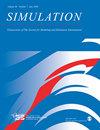有效性框架支持的基于模型的工程流程
IF 2
4区 工程技术
Q4 COMPUTER SCIENCE, INTERDISCIPLINARY APPLICATIONS
Simulation-Transactions of the Society for Modeling and Simulation International
Pub Date : 2023-11-08
DOI:10.1177/00375497231205035
引用次数: 1
摘要
基于模型的系统工程(MBSE)侧重于使用模型来支持复杂网络物理系统(cps)的设计、优化、仿真和最终部署。这些模型能够在计算机上对(实现的)现实世界系统的行为进行推理和预测。使用这种(预测)模型的价值取决于它相对于现实世界对应模型的有效性。因此,模型的有效性上下文对于确保正确使用模型至关重要。只有在设计时明确地捕获模型的有效性时,才能对有效性进行推理。在以前的工作中,有效性框架(VF)被认为是一种显式捕获模型有效性的方法;然而,没有给出关于MBSE过程中的集成过程的指导。在本文中,我们将介绍模型及其vf的创建和演化,以确保模型的有效性、一致性和完整性。这种演变产生了一组相互关联的模型和vf。通过捕获这些关系,我们创建了一个轻量级的支持框架的模型变体库。我们使用F1/10车辆模拟试验台来展示我们的贡献。本文章由计算机程序翻译,如有差异,请以英文原文为准。
Validity Frame–enabled model-based engineering processes
Model-based systems engineering (MBSE) focuses on using models to support the design, optimization, simulation, and ultimately deployment of complex cyber-physical systems (CPSs). These models enable reasoning about and predicting the behavior of the (realized) real-world system in silico. The value of using such (predictive) model depends on its validity against its real-world counterpart. As such, the validity context of a model is critical to ensure correct model use. Reasoning on validity is only possible if the validity of the model was captured explicitly at design time. In previous work, the validity frame (VF) was presented as a way to explicitly capture a model’s validity; however, no guidance on the integration process within MBSE processes was given. Within this article, we present the creation and evolution of the model and its VFs to ensure model validity consistency and completeness. This evolution results in a set of interrelated models and VFs. By capturing these relations, we create a lightweight frame-enabled library of model variants. We show our contribution using an F1/10 vehicle simulation test bench.
求助全文
通过发布文献求助,成功后即可免费获取论文全文。
去求助
来源期刊
CiteScore
3.50
自引率
31.20%
发文量
60
审稿时长
3 months
期刊介绍:
SIMULATION is a peer-reviewed journal, which covers subjects including the modelling and simulation of: computer networking and communications, high performance computers, real-time systems, mobile and intelligent agents, simulation software, and language design, system engineering and design, aerospace, traffic systems, microelectronics, robotics, mechatronics, and air traffic and chemistry, physics, biology, medicine, biomedicine, sociology, and cognition.

 求助内容:
求助内容: 应助结果提醒方式:
应助结果提醒方式:


